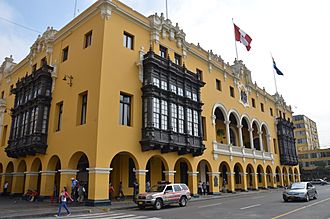Palacio Municipal de Lima facts for kids
The Palacio Municipal de Lima, also known as the City Hall of Lima, is an important public building. It's where the Metropolitan Municipality of Lima (the city government) works. You can find it in the heart of Lima's historic center, right across from the main square, Plaza Mayor. It's on a street called Portal de Escribanos.
Quick facts for kids Palacio Municipal de Lima (City Hall of Lima) |
|
|---|---|

Frontis of the Municipal Palace of Lima and fountain of Viceroy García Sarmiento de Sotomayor Count of Salvatierra in the foreground
|
|
| General information | |
| Architectural style | Colonial |
| Town or city | Lima |
| Country | Peru |
| Construction started | 1939 |
| Design and construction | |
| Architect | Emilio Harth Terré, José Alvarez Calderón and Ricardo de Jaxa Malachowski |
Contents
History of Lima's City Hall
Early Days: The Viceroyalty Period
When Lima was first founded, it had two mayors. These were Nicolás de Ribera and Juan Tello de Guzmán. At first, the city council, called the Cabildo, worked in different places. They even used the House of Pizarro for a while.
In October 1535, the council moved to land owned by García de Salcedo. This is where the Archbishop's Palace of Lima stands today. But more space was needed for the Cathedral of Lima. So, in 1548, the council moved again. Their new home was on land owned by Hernando Pizarro. This is the same spot where the current City Hall is located.
Building the First City Hall
The first colonial town hall building was quite simple. Its construction was not easy. Master Diego de Torres was asked to build it in 1549. He worked quickly, even buying two enslaved people to help. The goal was to finish before Viceroy Antonio de Mendoza arrived in 1551. The building was made with brick and wood from Spain.
Later, in 1555, Cristóbal Garzón and Diego de Amaro took over the building work. Small repairs, like woodwork, continued for years. Some historians say the building eventually collapsed because it wasn't built well.
Life at the Old City Hall
From the balconies of the old colonial town hall, council members watched many events. These included processions and bullfights. Public gatherings were also held there.
In 1628, the historian and priest Bernabé Cobo described the Lima Cabildo. He wrote that the city jail was under the main arches. It had a large, well-decorated chapel. The offices for the clerks were also there. The ordinary mayors held their meetings at the main door.
Between 1596 and 1604, the building had an open gallery on the second floor. This gallery was above the scribes' portals.
Challenges and Disasters
The Rímac River Bridge collapsed in 1696. This caused a flood in the Plaza Mayor. Important documents kept on the floor were ruined. The greatest damage to the colonial city hall happened in 1746. A huge earthquake destroyed 90% of Lima's colonial buildings.
See also
 In Spanish: Palacio Municipal de Lima para niños
In Spanish: Palacio Municipal de Lima para niños
- Metropolitan Municipality of Lima
- City Hall
- Historic Center of Lima
- Lima
 | William L. Dawson |
 | W. E. B. Du Bois |
 | Harry Belafonte |


